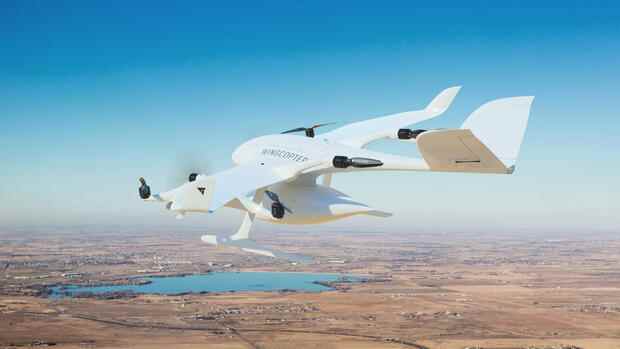Weiterstadt Even founder and CEO Tom Plümmer was surprised by the response: his delivery drone start-up Wingcopter raised 42 million euros in a financing round at the end of June – and it could have been even more. “In the last round of financing, we had to tell some interested investors that all the places for this round were taken,” says Plümmer, visibly proud: “We were oversubscribed, which is a very good sign, especially these days when some start-ups fighting for survival.”
Wingcopter is now working on the next round of financing, Plümmer and his team are continuing to talk to all interested parties. Because the young company from Weiterstadt near Darmstadt needs money.
Wingcopter is now well advanced in the development of its own flying vehicle. Plümmer explains that the American aviation authority FAA accepted the concept and in May defined the “airworthiness criteria” that Wingcopter’s aircraft must meet in order to be approved for American airspace. This represents a “big step in the certification of an unmanned aerial vehicle for commercial operation in the USA,” says Plummer. The authorities in Europe and Japan are also “very cooperative”.
The prospect of soon being able to deliver medicines or other products with a drone is generating a lot of interest among potential customers. “Our production is running at full capacity this year. The order books for the two following years are already well filled,” says Plummer.
Top jobs of the day
Find the best jobs now and
be notified by email.
>> Also read: Start-up Jedsy delivers to the balcony by drone
The positive trend will continue beyond 2025, also thanks to a major project in Africa. Wingcopter will deliver up to 12,000 drones to African partner Continental Drones over the next five years. Continental Drones intends to set up a new transport network in numerous countries south of the Sahara.
Employees urgently wanted
In order to be able to deliver so many drones, Wingcopter needs space for series production. “We are already looking around for building land and are confident that the state of Hesse, which has invested in us, can help us,” says Plümmer. The team is also considering factories on other continents, but initially wants to expand production at the company’s headquarters in Weiterstadt.
Every corner of the large production hall is used, but it’s not getting cramped yet. “The hall here in Weiterstadt is sufficient for all the pre-orders. The machines for the planned production of several thousand drones per year have already been installed and are in operation,” says Plummer.
These machines will soon be producing even more drones per day, and Wingcopter wants to hire new employees for this. “We want to grow to 200 employees by the end of the year, but the workforce is also to be expanded further after that. We would like to set up a three-shift operation and create even more local jobs.”
Robots are intended to support employees in production and increase efficiency. A first Kuka device is already in use in a protected room. “Through automation, we can reduce the workload from a few days to a few hours,” explains Plummer.
The founder and CEO of Wingcopter wants to grow with delivery drones, especially in the B2B business.
(Photo: Wingcopter)
Plummer founded Wingcopter in 2017 with fellow students from Darmstadt. They developed an electric high-flyer that can carry six kilograms of freight and cover a distance of up to 110 kilometers in one hour.
According to experts, the cargo business with electric VTOL aircraft should be the first to reach a significant size – much earlier than air taxis for passengers. The venture capital firm Levitate Capital expects a global market volume of 33 billion US dollars for the year 2030.
In the Southeast African landlocked country of Malawi, Wingcopter has been supplying remote and hard-to-reach regions with medicines since 2018, in cooperation with the German Society for International Cooperation (GIZ). “Projects like the one in Malawi are designed for the long term, it’s not just a test for us,” says Plummer.
Wingcopter has set itself the goal of improving people’s lives in the long term. “That’s not just a saying, we want to achieve a significant effect here worldwide by 2030.” Jobs are also being created there.
The drone from Weiterstadt does not need a complex infrastructure. “We set up everything we need in one day,” says Plummer. Wingcopter erects a concrete take-off and landing platform and sets up a modified shipping container for the staff with everything they need to monitor the drone flights.
The drones will soon no longer only transport medicines. “We are considering how best to use the network effect of our drones in the future. Wingcopters that are used for medicine can also transport other things, such as food,” says Plümmer.
No delivery to private customers
However, the young entrepreneur does not have a delivery to end customers in mind. First of all, it is about the delivery between companies, the so-called B2B business in structurally weak regions.
The retailer Rewe also got involved in the latest round of financing and, according to its own statements, sees the start-up as an important partner for a future-oriented topic. What the retail group means by that specifically, he leaves open. For Plümmer, however, it is a strong sign of expansion into B2B business: “Our investor Itochu also operates one of the largest supermarket chains in Japan with over 24,000 shops.”
Numerous companies are working on the idea of a delivery drone. In the US, for example, Zipline claims to have completed more than 250,000 commercial shipments. However, Plummer is not afraid that competitors could catch up with Wingcopter.
“You can’t just copy,” he says. Firstly, Wingcopter’s core innovations in hardware and software have been patented. On the other hand, everyone has to go through the lengthy certification process “in which we have been going for several years”.
More: Major order for Wingcopter: US Air Service orders delivery drones
